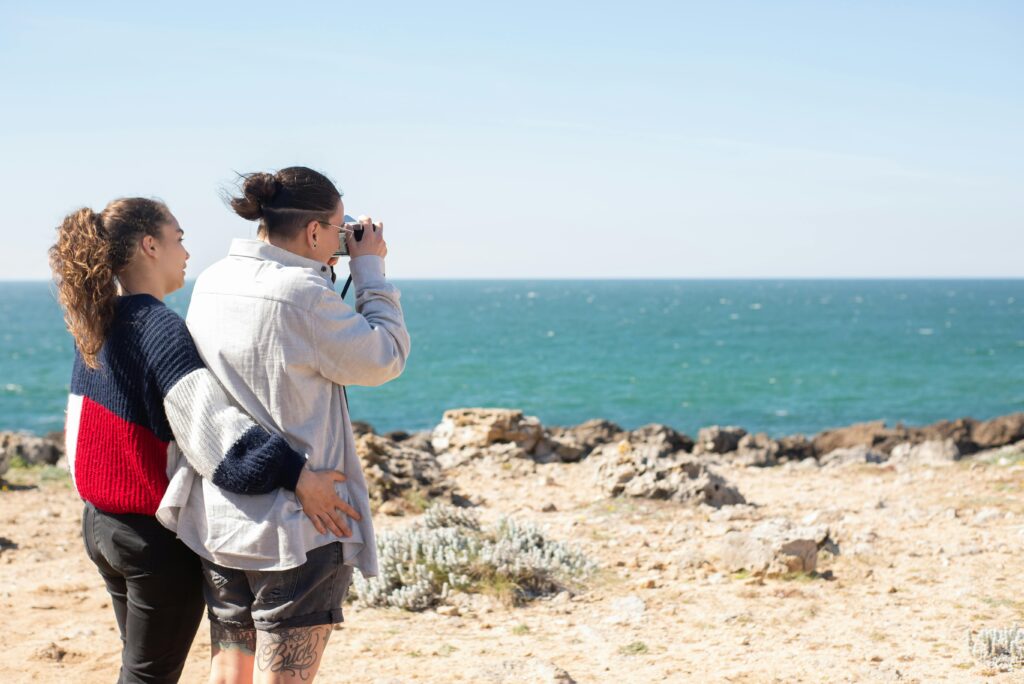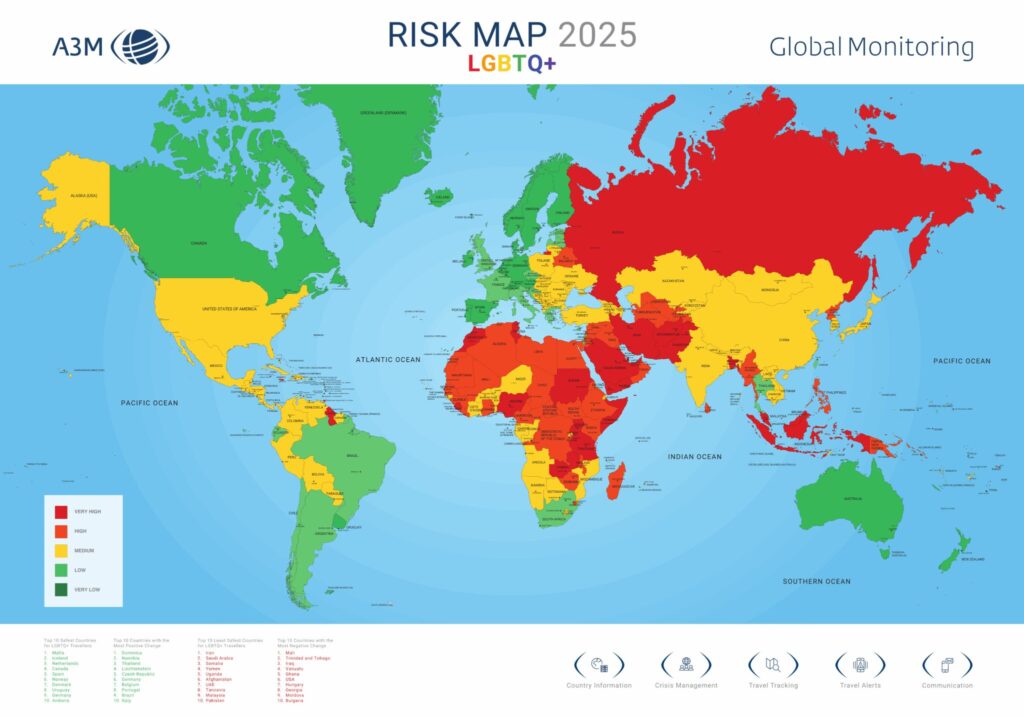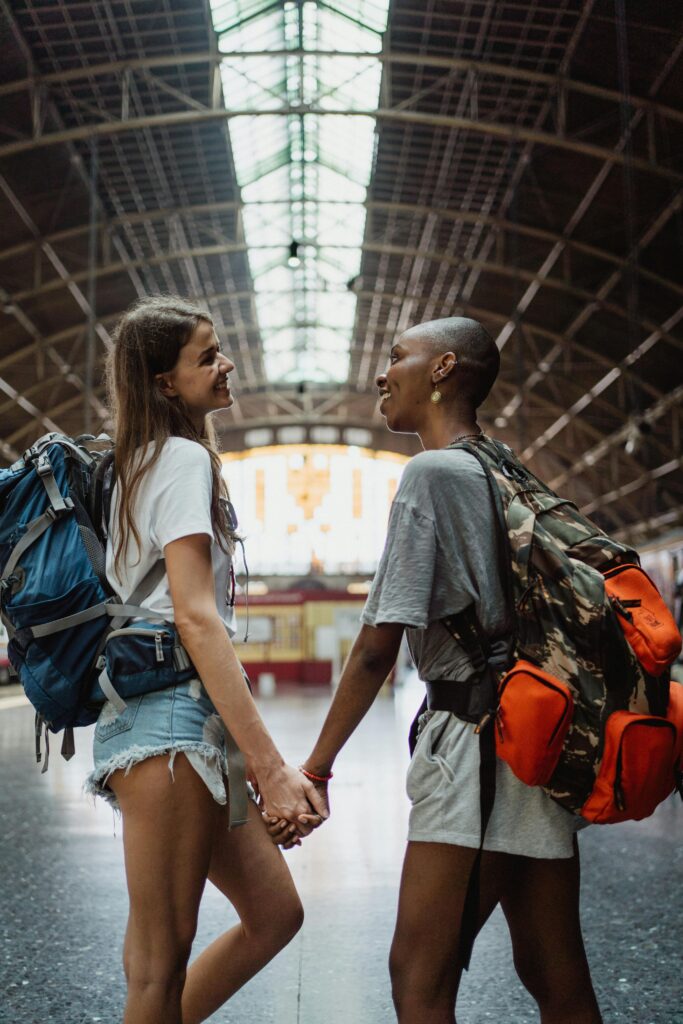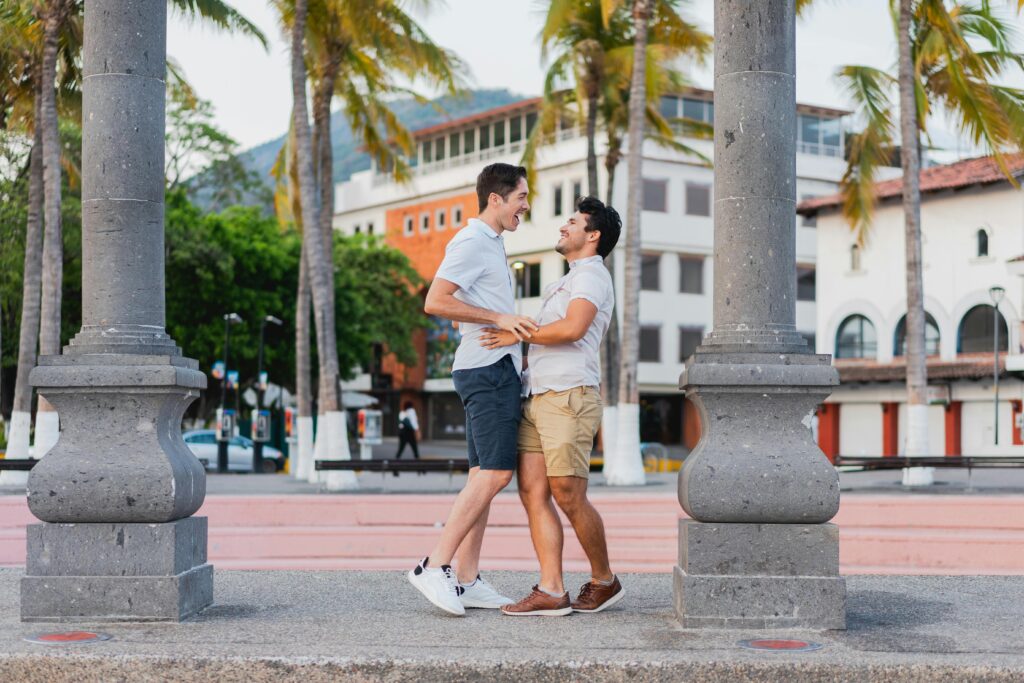
New LGBTQ World Travel ‘Risk Map’ Released
How safe do LGBTQ+ people feel when traveling? Where is social acceptance most noticeable? A new survey and map offer fresh and compelling insight.
For the first time, in partnership with Diversity Tourism and A3M Global Monitoring, ITB Berlin has conducted a survey among queer travelers and presented the data in cartographic form to show where LGBTQ+ travelers feel most at risk when traveling.
Some of the findings are surprising. While Canada and Spain are consistently perceived as safe, social acceptance in Germany remains rather cautious, despite substantive progress on equal legal rights. The U.S., as might be expected of recent months, reflects a deep divide, where regional differences are evident.
A3M has now published these data in the form of its latest LGBTQ+ Risk Map 2025 documenting developments worldwide.
ITB Berlin, the world’s leading travel trade show, has long set standards when it comes to highlighting and documenting diversity in tourism. As a trailblazer in this field, together with Diversity Tourism, consultants for LGBTQ+ tourism and diversity marketing, and the security analysts A3M Global Monitoring, it was first to undertake a comprehensive survey of queer travelers’ experiences. The survey, titled Perceptions and Experiences of LGBTQ+ Travelers, was conducted between December 2024 and April 2025. Its findings will also be incorporated into topics at the upcoming ITB Berlin from 3 to 5 March 2026.

The survey specifically targeted queer travelers from the ITB and LGBTQ+ community (via newsletter, social media, the website and the LGBTQ+ travel portal Tomontour.de) and contained 16 questions about subjective perceptions of social acceptance, equal legal rights, safety in dealing with authorities, experiences with the police, healthcare systems and use of social networks. In addition, in-depth interviews were conducted with LGBTQ+ tourism experts and frequent travelers. The aim was not only to look at the overall legal situation, but above all to capture individual perceptions of safety and the actual experiences of queer people on their regular travels – reflecting a broader scope and offering more detail.
“The survey for the first time offers a deeper insight into the personal experiences of queer travelers worldwide – an important step towards putting objective safety ratings into the context of personal perspectives. Irrespective of not being statistically representative it provides a robust qualitative basis. We take the findings very seriously and will incorporate them into further developing our LGBTQ+ segment at ITB Berlin. We are fully committed to promoting LGBTQ+ travel not just during the trade show but 365 days a year,” said Ramona Zaun, LGBTQ+ commissioner at ITB Berlin.

Initial Findings
Canada and Spain top the list of countries perceived as safe for travel. In both countries, 100% of respondents confirm that LGBTQ+ people are treated with respect. Showing affection in public is also considered unproblematic in Spain (90%) and Canada (71%). The majority experience the police as supportive in both countries.
In contrast, the verdict on the U.S. is mixed: only around one-third agree that queer couples can openly show affection and that the police are LGBTQ+ friendly. What is particularly striking is the widely divergent ratings – an indication of significant regional differences between progressive cities and more conservative regions.
The views on Germany are ambivalent. Despite progressive legislation, social acceptance is seen as half-hearted. Only around half of respondents feel at ease as LGBTQ+ people in public or say they are treated equally by the authorities.
One key finding is that not all groups within the LGBTQ+ community feel equally safe. In almost all countries, differences were noted between gay men and transgender or intersex people – the latter group experiencing discrimination much more often.

A Deeper Look
The one-hour expert interviews confirmed many of the survey’s findings and provided further context:
In South America, for example in Brazil, Chile and Peru, queer travelers generally experience a high level of tolerance in tourist regions – despite some restrictive legislation.
In China and Dubai, too, the authorities are often pragmatic as long as queer travelers behave “discreetly“.
Transgender and intersex people face particular challenges worldwide, for example unrecognised gender entries in passports or untrained staff at security checks
Obstacles are mounting particularly in the U.S., where recognition of non-binary identities has been reversed.
In Spain on the other hand social acceptance is described as being firmly established – cities such as Madrid, Barcelona and areas on the Mediterranean as well as the Canary Islands are considered particularly LGBTQ+ friendly.
Younger queer travelers from Western societies react more sensitively to restrictions on public behavior, whereas members of the older generation, having grown up with discrimination, are more willing to adapt on their travels.
“Right now the safety situation for queer travellers is changing rapidly in some parts – not just in legal terms but in society as well. Many LGBTQ+ people now live more confidently and openly – and with that there is a growing need for safety guidance. Legal frameworks on their own are frequently not enough. What matters is how safe people actually feel at a destination. That is precisely where our joint survey comes in,“ says Thomas Bömkes, managing director of Diversity Tourism und LGBTQ+, and tourism adviser to ITB Berlin.
A3M plans to set up an international network for LGBTQ+ travelers’ safety to collect and provide access to experiences, data and recommendations – to ensure better visibility, safety, and respect worldwide.
“Safety is more than a right – it is about perceptions and experiences“ is the survey authors’ conclusion. Only by collecting detailed information and collaborating at global level can queer travel be made truly safe and inclusive in the long term.



